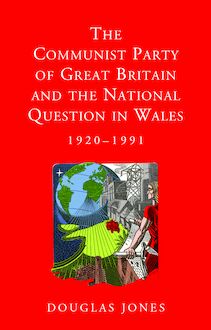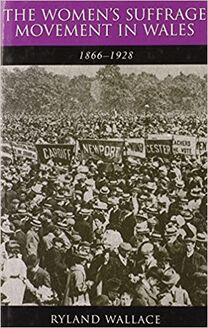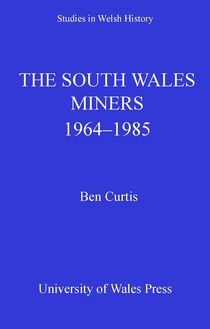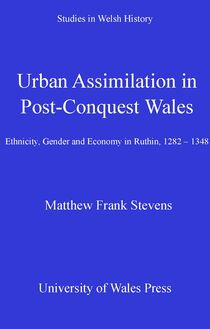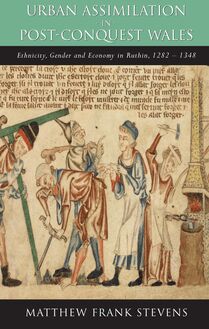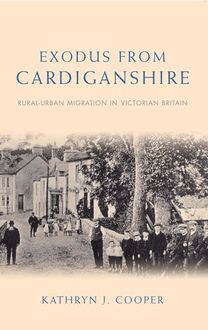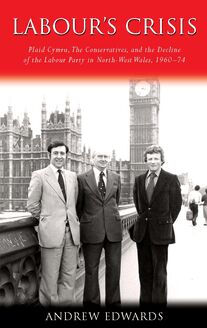-
 Univers
Univers
-
 Ebooks
Ebooks
-
 Livres audio
Livres audio
-
 Presse
Presse
-
 Podcasts
Podcasts
-
 BD
BD
-
 Documents
Documents
-
- Cours
- Révisions
- Ressources pédagogiques
- Sciences de l’éducation
- Manuels scolaires
- Langues
- Travaux de classe
- Annales de BEP
- Etudes supérieures
- Maternelle et primaire
- Fiches de lecture
- Orientation scolaire
- Méthodologie
- Corrigés de devoir
- Annales d’examens et concours
- Annales du bac
- Annales du brevet
- Rapports de stage
La lecture à portée de main
Vous pourrez modifier la taille du texte de cet ouvrage
Découvre YouScribe en t'inscrivant gratuitement
Je m'inscrisThe Opposition to the Great War in Wales 1914-1918 , livre ebook
Découvre YouScribe en t'inscrivant gratuitement
Je m'inscrisEn savoir plus
Vous pourrez modifier la taille du texte de cet ouvrage
En savoir plus

Description
This study is the first thorough analysis of the extent of the opposition to the Great War in Wales, and is the most extensive study of the anti-war movement in any part of Britain. It is, therefore, a significant contribution to our understanding of people’s responses to the conflict, and the difficulty of mobilising the population for total war. The anti-war movement in Wales and beyond developed quickly from the initial shock of the declaration of war, to the civil disobedience of anti-war activists and the industrial discontent excited by the Russian Revolution and experienced in areas such as the south Wales coalfield in 1917. The differing responses to the war within Wales are explored in this book, which charts how the pacifist tradition of nineteenth-century Welsh Nonconformity was quickly overturned. The two main elements of the anti-war movement are analysed in depth: the pacifist religious opposition, the Fellowship of Reconciliation, and the Nonconformist dissidents who were particularly influential in north and west Wales; and the political opposition concentrated in the Independent Labour Party and among the radical left within the South Wales Miners’ Federation.
Series editors’ foreword
Acknowledgements
List of tables list of abbreviations
Introduction
1. Religious Opposition to the War in Wales
2. Political Opposition to the War in Wales – the Independent Labour Party, the Russian Revolution and the ‘Advanced Men’
3. The Organisation of Opposition – the National Council for Civil Liberties and the No-Conscription Fellowship
4. Conscientious Objectors in Wales
Conclusion
Bibliography
Index
Sujets
Informations
| Publié par | University of Wales Press |
| Date de parution | 05 octobre 2018 |
| Nombre de lectures | 0 |
| EAN13 | 9781786833167 |
| Langue | English |
Informations légales : prix de location à la page 0,0824€. Cette information est donnée uniquement à titre indicatif conformément à la législation en vigueur.
Extrait
STUDIES IN WELSH HISTORY
Editors
RALPH A. GRIFFITHS CHRIS WILLIAMS ERYN M. WHITE
38
THE OPPOSITION TO THE GREAT WAR IN WALES, 1914–1918
THE OPPOSITION TO THE GREAT WAR IN WALES, 1914–1918
by
ALED EIRUG
© Aled Eirug, 2018
All rights reserved. No part of this book may be reproduced in any material form (including photocopying or storing it in any medium by electronic means and whether or not transiently or incidentally to some other use of this publication) without the written permission of the copyright owner. Applications for the copyright owner’s written permission to reproduce any part of this publication should be addressed to the University of Wales Press, University Registry, King Edward VII Avenue, Cardiff CF10 3NS.
www.uwp.co.uk
British Library CIP Data
A catalogue record for this book is available from the British Library
ISBN 978-1-78683-314-3
eISBN 978-1-78683-316-7
The right of Aled Eirug to be identified as author of this work has been asserted in accordance with sections 77 and 79 of the Copyright, Designs and Patents Act 1988.
The publisher has no responsibility for the persistence or accuracy of URLs for any external or third-party internet websites referred to in this book, and does not guarantee that any content on such websites is, or will remain, accurate or appropriate.
Cover image: Arthur W. Gay, The Conchie (1931). The Peace Museum. © The Artist’s Estate.
SERIES EDITORS’ FOREWORD
Since the foundation of the series in 1977, the study of Wales’s history has attracted growing attention among historians internationally and continues to enjoy a vigorous popularity. Not only are approaches, both traditional and new, to the study of history in general being successfully applied in a Welsh context, but Wales’s historical experience is increasingly appreciated by writers on British, European and world history. These advances have been especially marked in the university institutions in Wales itself.
In order to make more widely available the conclusions of original research, much of it of limited accessibility in postgraduate dissertations and theses, in 1977 the History and Law Committee of the Board of Celtic Studies inaugurated this series of monographs, Studies in Welsh History . It was anticipated that many of the volumes would originate in research conducted in the University of Wales or under the auspices of the Board of Celtic Studies, and so it proved. Although the Board of Celtic Studies no longer exists, the University of Wales Press continues to sponsor the series. It seeks to publish significant contributions made by researchers in Wales and elsewhere. Its primary aim is to serve historical scholarship and to encourage the study of Welsh history.
CONTENTS
SERIES EDITORS’ FOREWORD
ACKNOWLEDGEMENTS
LIST OF TABLES
LIST OF ABBREVIATIONS
INTRODUCTION
1 Religious Opposition to the War in Wales
2 Political Opposition to the War in Wales – the Independent Labour Party, the Russian Revolution and the ‘Advanced Men’
3 The Organisation of Opposition – the National Council for Civil Liberties and the No-Conscription Fellowship
4 Conscientious Objectors in Wales
CONCLUSION
NOTES
BIBLIOGRAPHY
ACKNOWLEDGEMENTS
This book has been in gestation since 1977 and has been inspired by my father, Dewi Eirug Davies, a conscientious objector in the Second World War, and my grandfather Tom Eirug, a conscientious objector in the First World War, who unfortunately I never met. I have tremendous respect and love for both men and they have been at my side on this journey towards publication.
My academic interest in the Opposition to the Great War was inspired by the boundless enthusiasm and ceaseless intellectual curiosity of my history tutor in Aberystwyth University, Deian Hopkin. Although a life and a career in journalism intervened to postpone work on this book until 2010, for thirty years, my interest in Welsh history was sustained by Llafur, the Welsh people’s history society, the inspiring example of its founders, including Deian, the miners’ leader Dai Francis and his son Hywel, its organiser Sian Williams and the comradeship of its members. It has made a remarkable contribution to political and historical thought in Wales, and has brought thinkers from different traditions together to create history that is relevant to us all.
The key individual who made this book possible is Professor Chris Williams of Cork University, my supervisor, who shepherded an inexperienced, albeit mature, student through the pitfalls and blind alleys of research. Dr Martin Wright was a pillar of strength both as chair of Llafur and as my second supervisor, and Professor Bill Jones has shared his wisdom generously in the preparation of this book.
Numerous archives and libraries have been used for this book and I wish to record my thanks to the staff of the following institutions in Wales: the National Library of Wales, Bangor University Library and Archive, the South Wales Miners’ Library and Archive, the West Glamorgan Archive in Swansea, Cardiff University Library and Archive, Merthyr and Aberdare Public libraries, the Glamorgan Archives in Cardiff, and Cardiff Central Library. Beyond our borders, staff were unfailingly courteous and helpful at the British Library of Political and Economic Science in my alma mater in the London School of Economics, the National Archives at Kew, the House of Lords Archives, and the Friends House Library, the Bodleian Library in Oxford, the Cumbria Archives in Carlisle and the National Library of Scotland in Edinburgh.
Particular thanks are due to the Studies in Welsh History series editors, and in particular to Professor Chris Williams for his support, and Dr Llion Wigley and the staff of the University of Wales Press for guiding this book through the press. I must, however, take responsibility for any remaining errors.
Finally I owe an enormous debt of gratitude to my family. My wife, Maggie, has had to deal with my obsession with the Great War for the past eight years, and she has been a loving presence, knowing when to cajole, chivvy or sympathise. I owe her a great deal and this book is dedicated to her. I thank my stepchildren, Max and Holly, and my son, Tane, for their crucial love and support, and hope that this book will help them gain an understanding of how our generation stand on the shoulders of those who have gone before them.
LIST OF TABLES
Table 1: Monthly distribution of Y Deyrnas to shops and agents in 1917
Table 2: The Independent Labour Party in Wales
Table 3: Main Independent Labour Party Welsh branches April 1917–April 1918
Table 4: The vote of the SWMF districts in the ballot to down tools in the event of the government proceeding with their ‘comb-out’ scheme in the mines
Table 5: No-Conscription Fellowship branches and secretaries in Wales, May 1916
Table 6: NCF branches in December 1917
Table 7: Graham’s estimate of conscientious objectors in Britain
Table 8: Rae’s estimate of conscientious objectors in Britain
Table 9: Stated religious allegiance of conscientious objectors in Wales
Table 10: Stated organisational allegiance of conscientious objectors in Wales
Table 11: Geographical distribution of identifiable COs in Wales by county
Table 12: Conscientious objectors in Wales
Table 13: Conscientious objectors in Wales underthe Pelham Committee
ABBREVIATIONS Conscientious Objectors COs Fellowship of Reconciliation FoR Friends Ambulance Unit FAU Independent Labour Party ILP International Bible Students’ Association IBSA London School of Economics LSE Miners’ Federation of Great Britain MFGB National Archives NA National Council for Civil Liberties NCCL National Library of Scotland NLS National Library of Wales NLW No-Conscription Fellowship NCF Non-Combatant Corps NCC South Wales Miners’ Federation SWMF Royal Army Medical Corps RAMC Union of Democratic Control UDC Unofficial Reform Committee URC
INTRODUCTION
The commemoration of the hundredth anniversary of the Great War has concentrated on the military aspects of the conflict. Given that over 750,000 British soldiers died during the course of the war, including 35,000 Welshmen, it is inevitable that this terrible legacy has been uppermost in our minds. This war dominated British society for a generation, and its lasting effect was to mobilise civil society in support of the armed forces in ‘total war’. But attitudes towards the war were not uniform throughout the country, and those who doubted the wisdom of going to war, and dissented from the rush to arms, were obscured by the public hysteria and the initial enthusiasm that greeted the outbreak of the conflict. This study suggests that our understanding of the impact of the profoundly traumatic experience of the Great War and the effect of this social and economic watershed for Welsh society is incomplete without an appreciation of the diversity of responses to it, including the opposition to the war.
The shock of the onset of war in August 1914, the pro-war enthusiasm of Welsh political leaders, such as Lloyd George, and the patriotic fervour that led thousands to volunteer for the armed forces have tended to dominate our image of Wales’s initial response to war. This shock was heightened by the contrast with Wales’s pre-war radical Nonconformist tradition of pacifism and its deep suspicion of the armed forces, regarded as social outcasts and unemployable. The army was suspicious towards the Welsh language, and Nonconformist ministers were prohibited from serving as chaplains. 1 This antipathy towards the military was reflected by Wales’s status as the leanest recruiting area in Britain before the war, when Welshmen made up only 1.8 per cent of the regular army. 2
The pacifist legacy was closely associated with a number of formidable Nonconformist radicals, including Samuel Roberts, Llanbrynmair, who had opposed the Crimean War and campaigned for an international arbitration court, and Henry Ric
-
 Univers
Univers
-
 Ebooks
Ebooks
-
 Livres audio
Livres audio
-
 Presse
Presse
-
 Podcasts
Podcasts
-
 BD
BD
-
 Documents
Documents
-
Jeunesse
-
Littérature
-
Ressources professionnelles
-
Santé et bien-être
-
Savoirs
-
Education
-
Loisirs et hobbies
-
Art, musique et cinéma
-
Actualité et débat de société
-
Jeunesse
-
Littérature
-
Ressources professionnelles
-
Santé et bien-être
-
Savoirs
-
Education
-
Loisirs et hobbies
-
Art, musique et cinéma
-
Actualité et débat de société
-
Actualités
-
Lifestyle
-
Presse jeunesse
-
Presse professionnelle
-
Pratique
-
Presse sportive
-
Presse internationale
-
Culture & Médias
-
Action et Aventures
-
Science-fiction et Fantasy
-
Société
-
Jeunesse
-
Littérature
-
Ressources professionnelles
-
Santé et bien-être
-
Savoirs
-
Education
-
Loisirs et hobbies
-
Art, musique et cinéma
-
Actualité et débat de société
- Cours
- Révisions
- Ressources pédagogiques
- Sciences de l’éducation
- Manuels scolaires
- Langues
- Travaux de classe
- Annales de BEP
- Etudes supérieures
- Maternelle et primaire
- Fiches de lecture
- Orientation scolaire
- Méthodologie
- Corrigés de devoir
- Annales d’examens et concours
- Annales du bac
- Annales du brevet
- Rapports de stage

